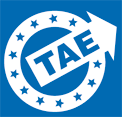TAE on the Debate about “Future of the EU and Competitiveness – a Strategic Outlook”
Background
The debate about Europe's future, particularly with regard to resilience and increased competitiveness, has inevitably gained momentum. This has been triggered, among other things, by economic pressure from the United States under the new American administration and China's aggressive state trade policy, which is placing a massive strain on the competitiveness of European companies. The ongoing war in Ukraine, geopolitical tensions, the energy crisis, external effects such as the corona virus pandemic, insecure supply chains, and the rapidly advancing technological transformation have exposed the EU's structural weaknesses. Added to this are other massive challenges such as combating the effects of climate change, demographic developments, improving internal and external security, and migration and refugee flows from third countries.
Competitiveness also suffers from homegrown problems such as excessive EU bureaucracy. According to EUR-Lex, 14,065 basic and amending acts were adopted in the last legislative period (2019-2024) alone. This year, the number has already risen to 907! As important—and in some cases well-founded—as regulations may be, they generally lead to additional burdens for businesses and ultimately for consumers. Moreover, when regulations only apply in Europe, competitiveness always suffers, especially that of small and medium-sized enterprises (SMEs).
The fact is that Europe is losing its appeal as a business location. To avoid losing ground among the major players, Europe must reposition itself and improve its position. The new EU Commission has recognized this and intends to proactively counteract it. While discussions, plans, and objectives are welcome, all stakeholders must be clear that we must act quickly. However, concrete implementation and, above all, speed are still lacking.
The EU is now at a turning point. Those who want to remain competitive and able to defend themselves need the courage to simplify and invest in the future. An agenda for strategic autonomy is needed, including an SME-friendly internal market.
What is needed are substantial and sustainable EU solutions that lay the foundation for growth and prosperity for all. Solutions that are efficient and, when public funds are used, generate maximum benefit at minimum cost. One could also say: It is time for a renaissance of the values in the spirit of the EU's founding fathers, including subsidiarity and a clear commitment to a market economy. More Europe where necessary and less Europe where possible.
Following are some ideas on what should be the focus of the discussion from the taxpayers’ point of view.
Download TAE Approaches “Future of the EU and Competitiveness”
Brussels, June 4, 2025



